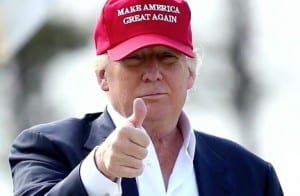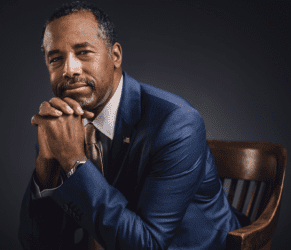
 Given the heated rhetoric this election cycle, a plagiarism scandal sounds almost quaint. Yet that is exactly what we are faced with this week.
Given the heated rhetoric this election cycle, a plagiarism scandal sounds almost quaint. Yet that is exactly what we are faced with this week.
The story began on March 16 when Alex Pappas at The Daily Caller wrote an article entitled “Trump Appears to Have Heavily Plagiarized Op-Ed from Carson.” In the article, Pappas accused Republican Presidential hopeful Donald Trump of plagiarizing an op-ed piece from former Republican contender Ben Carson.
According to Pappas, on February 26 an op-ed piece was published under Carson’s name in the Marianas Variety, a newspaper published in the Northern Marianas Islands. The piece expressed Carsons’s views on improving equality and fairness with Americans living in territories and commonwealths, such as the Northern Marianas Islands.
Then, on March 9, Donald Trump published a similar op-ed in the Pacific Daily News, a Guam-based newspaper that is also distributed to other Pacific territories. Pappas’ analysis showed that the two op-eds shared a lot more than similar ideas, but included large chunks of overlapping text including the initiatives that each candidate said they will take when they are elected to office.
But while the story seems to be a straightforward case of plagiarism, it’s complicated by the fact Ben Carson dropped out of the Presidential race on March 4th. In doing so, he suspended his campgain and released his staff. According to Carson, many of those staff members have since gone to work for Trump and, as such, may have had a hand in writing the Trump op-ed.
This is why Carson has said he is not bothered or surprised “at all” by the overlap.
But the scandal raises some very difficult questions for Trump and for politics in general. To really parse why this scandal is so complicated we have to first delve into the world of politics and ghostwriting, a world few want to talk about at all.
Politics, Ghostwriting and Audience Expectations
 Looking at the two works side by side, which you can see in Pappas’ comparison, it’s very clear that there is a lot of overlapping text, including what many will likely see as the most important part, the proposed policy changes.
Looking at the two works side by side, which you can see in Pappas’ comparison, it’s very clear that there is a lot of overlapping text, including what many will likely see as the most important part, the proposed policy changes.
But things get thornier when you look at what Ben Carson said, namely that the two articles were likely written by the same staffer, who went to work for Trump after Carson suspended his campaign.
That seems highly likely. Despite how contentious politics can be, campaigns routinely pull staff members from one another and those staffers often rotate as campaigns start up and shut down.
Furthermore, ghostwriting, for better or worse, is a commonly accepted practice in politics. The reason comes down to audience expectation and the importance of authorship in the piece.
When a journalist has a byline, we reasonably expect the journalist wrote the piece and that authorship can be crucial on matters of bias and transparency. This is why Jonah Lehrer and Jayson Blair were treated so harshly.
However, politicians are in a different boat. There is almost no expectation that politicians write all of their speeches, op-eds, website content, etc. and the exact authorship is less important so long as the substance represents the politician’s actual views.
Plagiarism scandals against politicians tend to carry more weight when they involve content where the authorship extremely important. Examples of this include John Walsh’s career being destroyed after it was discovered he had plagiarized his thesis and Joe Biden, who suffers far more from allegations he plagiarized in law school than allegations he plagiarized in a 1987 speech.
Other plagiarism scandals involving speeches and op-eds haven’t done nearly as well, partly because the facts have been weaker, but also because of an understanding that the candidate is not the author of the words. Examples here include the Obama scandal of 2008 and the McCain scandal from the same year.
But even if we accept that Trump is not the author and that his use of ghostwriters is acceptable, there’s still a serious problem we have to break down: How plagiarized (or at least recycled) content was published under his name.
Politics and Transparency
There’s almost no chance that Donald Trump personally plagiarized Ben Carson. Both articles were almost certainly written by staffers and, as Carson himself said, it was likely the same one(s).
So while it’s unlikely that Trump himself plagiarized, he does have some serious questions to answer:
- Does the article still represent your views?
- Was this a case of an author recycling previous work or was a staffer plagiarizing another campaign?
- How was an article with significant overlapping text allowed to be printed? Why was it not checked before submission?
- What action, if any, will be taken against the ghostwriter of the post?
However, it’s unlikely that we’re going to get any real answers from the Trump campaign. Even with several major media outlets covering the story, there’s been no response from anyone other than Carson.
It’s also unlikely that this scandal is going to have any serious impact. Not only is it a ghostwritten piece and not an actual plagiarism by Trump, it’s likely a case of careless self-plagiarism rather than plagiarism from a competing campaign.
But the biggest problem when one looks at what makes a political plagiarism scandal successful is the timing. Trump is far from vulnerable right now and is the clear frontrunner for his party. Furthermore, the allegations of plagiarism seem almost vapid when stacked up against trump’s other controversies.
A plagiarism scandal isn’t going to sink the Trump campaign, it isn’t likely to even be a footnote.
Bottom Line
There is one additional piece of trivia. The other party in this plagiarism story, Ben Carson, was himself accused of plagiarism over a year ago in his book America the Beautiful: Rediscovering What Made This Nation Great. Plagiarism he apologized for shortly after the facts came to light.
Though opponents needled at him over the allegations, reaching a crescendo when he briefly became a frontrunner, they had little impact on his overall campaign.
While Carson never stated publicly that the book was ghostwritten in whole or in part, similar authorship rules apply. Celebrities, political and otherwise, routinely have their books ghostwritten. Once again, even if I do view it as technically plagiarism, the audience expectation of originality is not there and authorship is not important, just the accuracy.
Still, when an author, especially one in the political spotlight, puts out something under their name, they have an obligation to it. That obligation includes making sure the work is accurate, that it steers clear of any ethical missteps and that represents you correctly.
In this case, Donald Trump and his campaign failed in that task. They allowed clearly copied text to be republished under his name. However, it’s unlikely that this misdeed nor their lack of response will have any impact on the campaign.
Plagiarism still matters in politics, but when the rhetoric is as heated as it is right now, it doesn’t do anything to turn up the temperature.
Want to Reuse or Republish this Content?
If you want to feature this article in your site, classroom or elsewhere, just let us know! We usually grant permission within 24 hours.